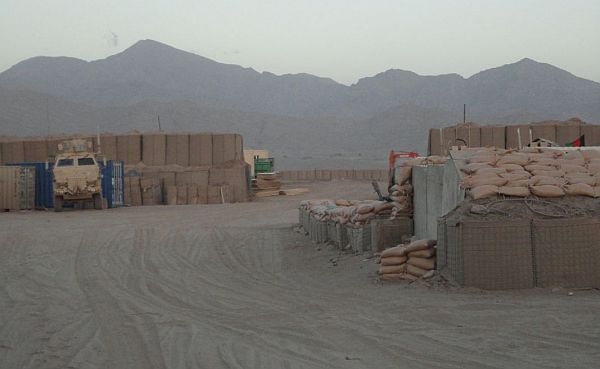Visit The Series Page:
Report From Afghanistan

(Host) We turn now to "Report from Afghanistan", our series about the yearlong deployment of the Vermont National Guard.
Most of the Vermont Guard soldiers are deployed in relatively safe areas of the country, where the military is working with civil servants to help residents build infrastructure, now that security has been improved.
But in Paktya province, there are still areas where the insurgency is strong and the Vermont Guard is trying to gain the upper hand.
VPR’s Steve Zind is with the Guard in once such area, and has this report.
(Interior of truck)
(Zind) It’s late in the day as a convoy of gun trucks races through the dust and dimness toward the Zormat district in Paktya province.
The roads are unpaved and rough and the passengers are tossed against their shoulder harnesses and lifted off their seats. The interior of the truck fills with the dust raised by the vehicles ahead of it.
The truck is responding to the report of another in a series of improved explosive devices planted in area roads in just the past week.
While not as dangerous and attack prone as other areas of Afghanistan, this district is one where Vermont Guard soldiers and insurgents are still vying to gain the upper hand. In fact, it’s only in recent weeks that the Vermonters have taken up their position at a joint Afghan Army, coalition forces Combat Outpost called Raman Kheil.
Until now insurgents have moved in the area with relative freedom. In response to the recent spate of IEDs Vermont Guard Lieutenant Daniel Silver of Dover, New Hampshire led a foot patrol to talk to people who live in this agricultural region.
(Silver) "We talked to about 12 or 15 farmers. We instructed them that this late in the farming season and due to the amount of IED’s, 3,4 IEDs in the last seven days in this small area right here, that if they’re out past dark with a shovel near a road, its not going to look good to us."
(Zind) Silver said the farmers were friendly and he believes they understood what the soldiers’ concerns were. It’s the first contact he’s had with the people living in this area. Their support will be critical to clearing the area of insurgents, as the coalition soldiers work with the ANSF, or Afghan National Security forces to implement the military’s counter insurgency strategy. Here’s Delta Company First Sergeant Eric Duncan of Northfield.
(Duncan) "The relationship building is probably the most important piece of it. Putting a human face on yourself and your ANSF partners out in the local communities so they understand there are no storm troopers in our back yard. The area that we are currently sitting in inside AFCOP Raman Kheil was agreed upon by the local elders. They assigned this area, albeit not the most tactically sound area. What we’re building at this point is not a physical structure. We’re trying to open up as many avenues of approach into the homes and lives and the minds of the Afghans that we share this ground with as neighbors."
(Zind) That process is just beginning here in the Raman Kheil area. If it succeeds, it will likely be difficult and time consuming work.
The anti-government forces have a lot at stake too and they have their own hearts and minds campaign.
This statement, quote "Keep good relations with the local people. Our mission is to keep people safe," unquote, isn’t from the U.S. military’s counterinsurgency manual. It’s from a booklet by Mullah Omar, the leader of the Taliban.
For VPR news, I’m Steve Zind at joint Combat Outpost Raman Kheil in Paktya province, Afghanistan.
(Host) "Report from Afghanistan" is made possible by the VPR Journalism Fund.